BLOG
9 Different Types of Cargo Ships
Table of Contents
- Introduction
- Overview of Cargo Ship Categories
- Bulk Shipping
- Container Ships
- Passenger Ships
- Oil Tankers
- Chemical Ships
- Tugboats
- Deck Cargo Barges
- Self-Dumping Barges
- Floating Cranes
- Peida Machinery Group Co., Ltd.: A Leader in Ship Manufacturing
- Comparison of Cargo Ship Types
- FAQs
- Conclusion
Introduction
The maritime industry plays a vital role in global trade and logistics, with cargo ships being the backbone of transporting goods across continents. Cargo ships come in various types, each designed for specific kinds of cargo and operations. Peida Machinery Group Co., Ltd., a trusted name in ship manufacturing and trade, specializes in designing and constructing diverse cargo ship types to meet the unique needs of clients worldwide.
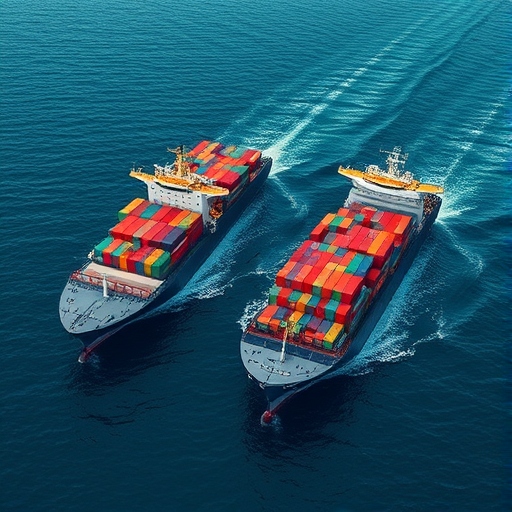
Comparison of Cargo Ship Types
| Ship Type | Primary Use | Key Features | Ideal Cargo |
|---|---|---|---|
| Bulk Shipping | Transporting unpackaged goods | Large holds, efficient loading | Grain, coal, ores |
| Container Ships | Carrying standardized containers | High capacity, versatile | General cargo |
| Passenger Ships | Mixed cargo and passenger transport | Comfort and safety features | Passengers and light cargo |
| Oil Tankers | Transporting liquid oil | Double-hulled, safety measures | Crude oil, refined products |
| Chemical Ships | Liquid chemicals transport | Anti-corrosion, safety mechanisms | Hazardous chemicals |
| Tugboats | Navigational assistance | High power, compact design | Towing operations |
| Deck Cargo Barges | Heavy/oversized cargo transport | Flat decks, simplified loading | Construction materials |
| Self-Dumping Barges | Loose material transport | Built-in dumping systems | Sand, gravel, soil |
| Floating Cranes | Heavy lifting in ports | High lifting capacity | Oversized items |
Overview of Cargo Ship Categories
Cargo ships are categorized based on the type of cargo they are built to carry and the specific functionality they offer. Below are the primary types of cargo ships:
Bulk Shipping
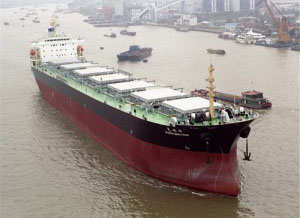
Bulk carriers are designed to transport unpackaged bulk goods like grains, coal, and ores.
Key Features:
- Large storage holds
- Efficient loading and unloading systems
- Often used for heavy, loose cargo
Container Ships
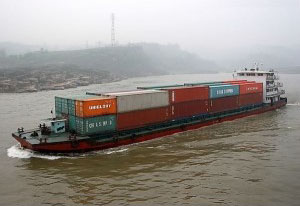
Container vessels are the most commonly used type for transporting goods in standardized containers.
Key Features:
- High capacity for containerized goods
- Compatible with global shipping standards
- Suitable for general cargo
Passenger Ships
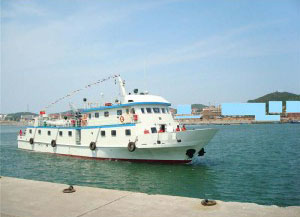
While primarily built to transport people, some passenger ships also have designated cargo areas.
Key Features:
- Mixed-use functionality for goods and passengers
- Focus on comfort and safety
- Ideal for shorter distances or routes requiring versatility
Oil Tankers
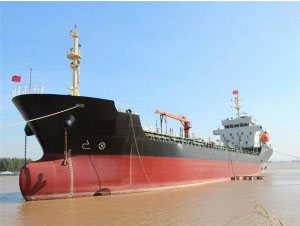
Oil tankers are designed to carry large quantities of crude oil or refined petroleum products.
Key Features:
- Double-hulled for safety
- Advanced pumping systems for quick loading/unloading
- Specialized storage tanks to prevent spillage
Chemical Ships
These ships are tailored for transporting liquid chemicals and other hazardous materials.
Key Features:
- Segregated storage compartments
- Anti-corrosion features
- Safety measures for handling hazardous cargo
Tugboats
Tugboats assist larger ships in navigating ports or moving through narrow waterways.
Key Features:
- High power-to-weight ratio
- Compact size for maneuverability
- Essential for towing and berthing operations
Deck Cargo Barges
Flat-bottomed vessels designed for carrying goods on their decks, typically used in rivers or coastal waters.
Key Features:
- Ideal for heavy or oversized cargo
- Simplified loading process
- Often used in construction projects
Self-Dumping Barges
Specialized for transporting and offloading loose materials like sand, gravel, and soil.
Key Features:
- Built-in dumping mechanisms
- Efficient unloading without additional equipment
- Durable construction for rugged use
Floating Cranes
Used for heavy lifting and loading/unloading large items in ports or offshore.
Key Features:
- High lifting capacity
- Versatility in construction and marine operations
- Often combined with other types of cargo ships for specific tasks
Peida Machinery Group Co., Ltd.: A Leader in Ship Manufacturing
Located in the Yangtze River region of China, Peida Machinery Group Co., Ltd. has over a decade of expertise in ship design, construction, and trade. The company’s extensive range of products includes:
- Bulk Cargo Ships
- Container Vessels
- Oil Tanker Ships
- Passenger Ships
- Deck Cargo Barges
- Self-Dumping Barges
- Tugboats
- Floating Cranes
Peida has earned approval from Classification Societies for meeting international standards, ensuring high-quality and reliable products for their clients.
Comparison of Cargo Ship Types
| Ship Type | Primary Use | Key Features | Ideal Cargo |
|---|---|---|---|
| Bulk Shipping | Transporting unpackaged goods | Large holds, efficient loading | Grain, coal, ores |
| Container Ships | Carrying standardized containers | High capacity, versatile | General cargo |
| Passenger Ships | Mixed cargo and passenger transport | Comfort and safety features | Passengers and light cargo |
| Oil Tankers | Transporting liquid oil | Double-hulled, safety measures | Crude oil, refined products |
| Chemical Ships | Liquid chemicals transport | Anti-corrosion, safety mechanisms | Hazardous chemicals |
| Tugboats | Navigational assistance | High power, compact design | Towing operations |
| Deck Cargo Barges | Heavy/oversized cargo transport | Flat decks, simplified loading | Construction materials |
| Self-Dumping Barges | Loose material transport | Built-in dumping systems | Sand, gravel, soil |
| Floating Cranes | Heavy lifting in ports | High lifting capacity | Oversized items |
FAQs
1. What factors should I consider when choosing a cargo ship type?
When selecting a cargo ship, consider the type of cargo, route, budget, and operational requirements such as loading and unloading facilities.
2. How does Peida Machinery ensure quality in their ships?
Peida Machinery Group Co., Ltd. follows rigorous standards approved by Classification Societies, ensuring their ships meet international quality and safety benchmarks.
3. What is the lifespan of a typical cargo ship?
A well-maintained cargo ship can last 25–30 years, depending on usage and environmental factors. Regular inspections and upkeep can extend its lifespan.
Conclusion
Cargo ships are the lifeline of global trade, with each type tailored to specific industrial needs. Peida Machinery Group Co., Ltd. stands out as a leading manufacturer, offering a comprehensive range of high-quality ships. By understanding the unique features and uses of each cargo ship type, businesses can make informed decisions to optimize their operations.
Explore Peida’s innovative solutions and elevate your shipping efficiency today!
BLOG
News
Contact Us
Contact: Peida Machinery Group Co. ,Ltd.
E-mail: info@peidaship.com
Tel: 0086 0556 5248992
Phone: 008618855615637
Add: City Anqing, Anhui Province